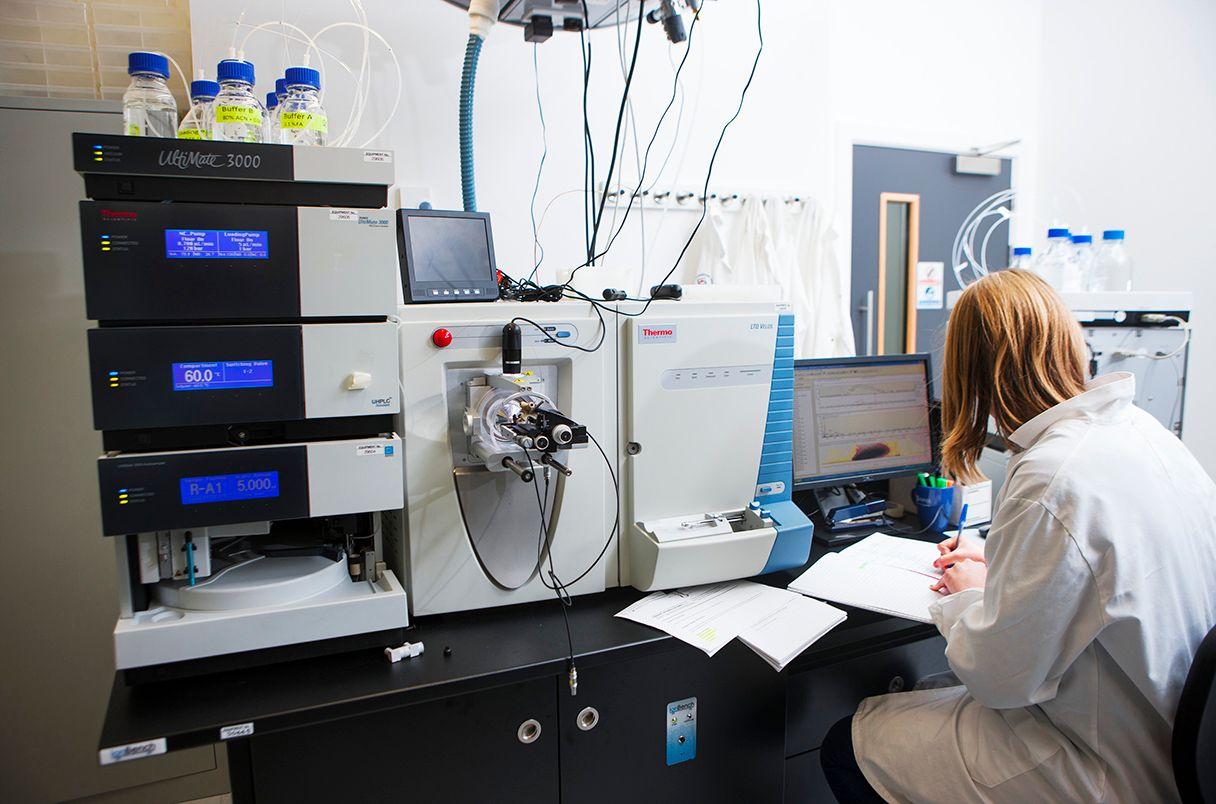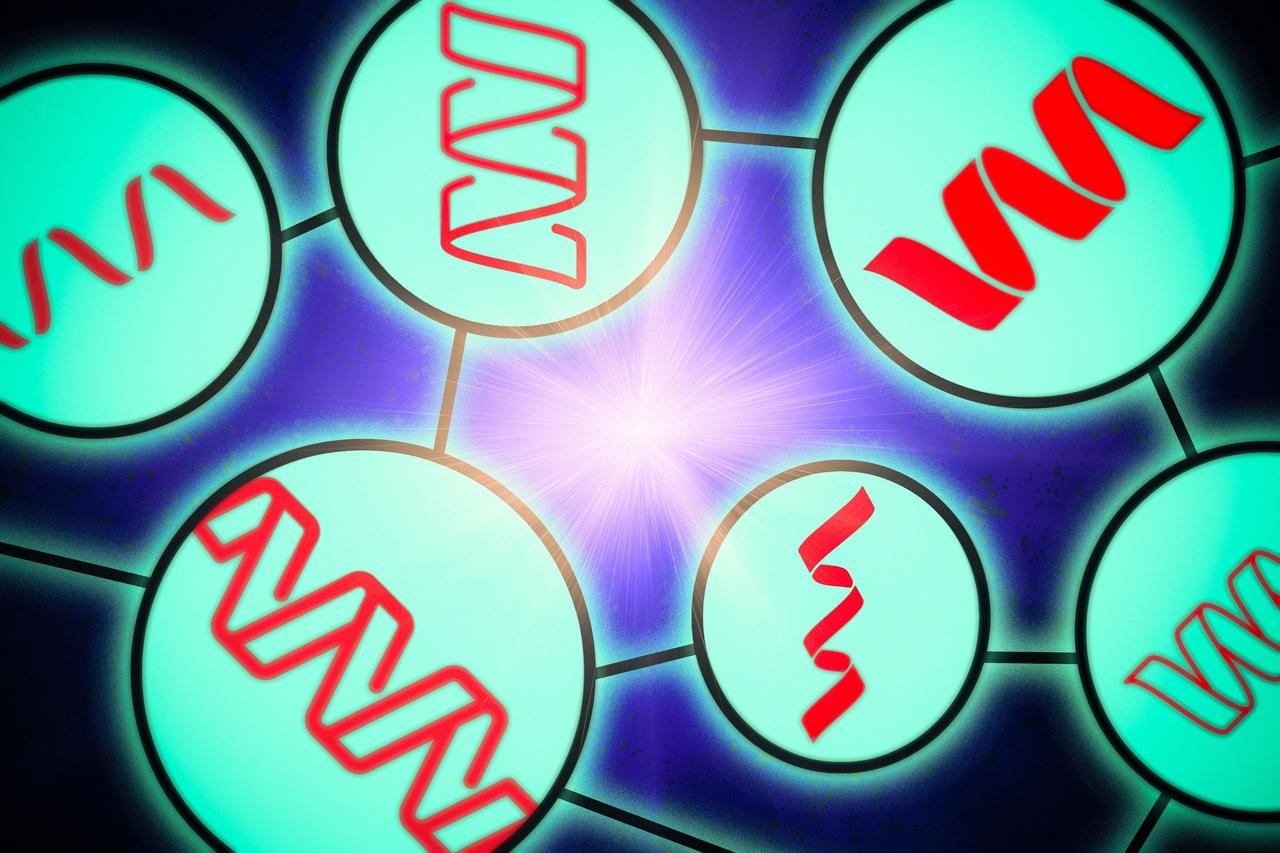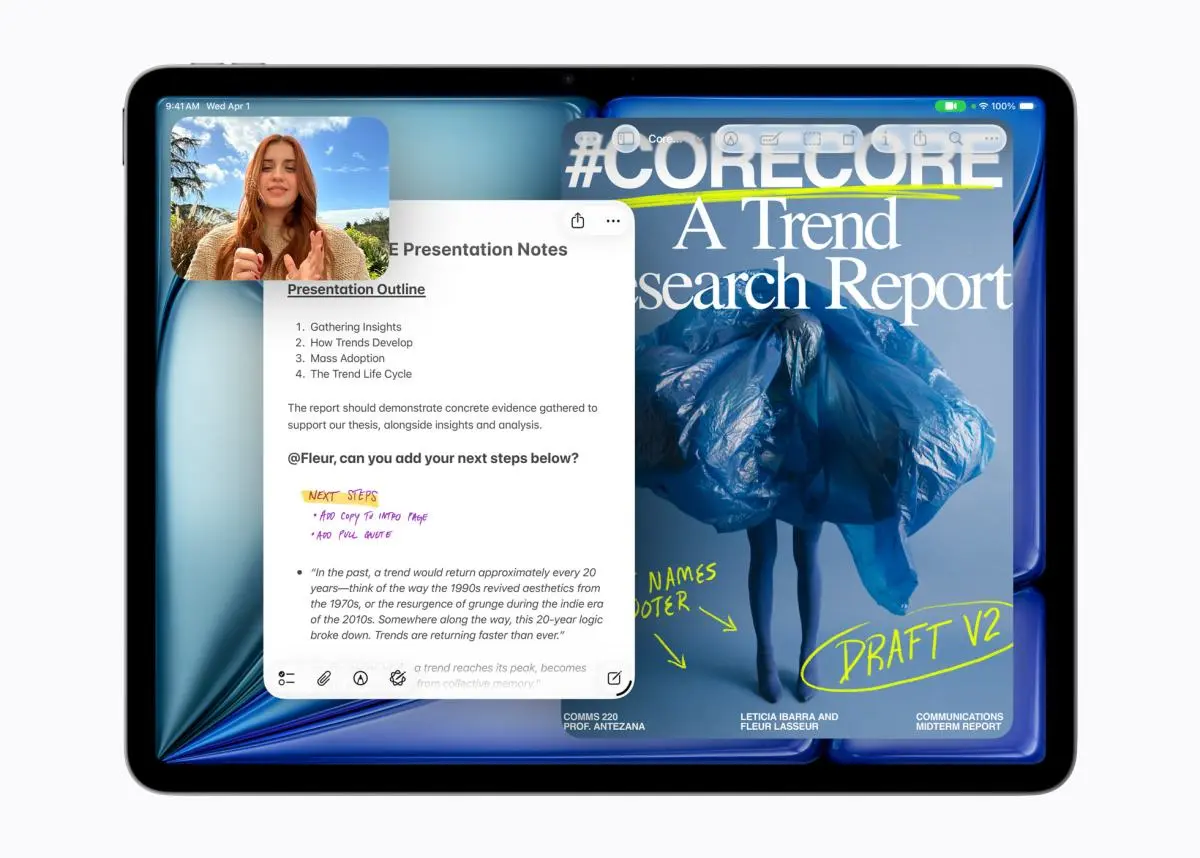AI Model Predicts Protein Location in Human Cells, Advancing Disease Research and Drug Development
2 Sources
2 Sources
[1]
With AI, researchers predict the location of virtually any protein within a human cell
Caption: Researchers performed validation experiments to test their new model. The top row shows the model's prediction of unseen cell lines and proteins, while the bottom row shows the experimental validation. A protein located in the wrong part of a cell can contribute to several diseases, such as Alzheimer's, cystic fibrosis, and cancer. But there are about 70,000 different proteins and protein variants in a single human cell, and since scientists can typically only test for a handful in one experiment, it is extremely costly and time-consuming to identify proteins' locations manually. A new generation of computational techniques seeks to streamline the process using machine-learning models that often leverage datasets containing thousands of proteins and their locations, measured across multiple cell lines. One of the largest such datasets is the Human Protein Atlas, which catalogs the subcellular behavior of over 13,000 proteins in more than 40 cell lines. But as enormous as it is, the Human Protein Atlas has only explored about 0.25 percent of all possible pairings of all proteins and cell lines within the database. Now, researchers from MIT, Harvard University, and the Broad Institute of MIT and Harvard have developed a new computational approach that can efficiently explore the remaining uncharted space. Their method can predict the location of any protein in any human cell line, even when both protein and cell have never been tested before. Their technique goes one step further than many AI-based methods by localizing a protein at the single-cell level, rather than as an averaged estimate across all the cells of a specific type. This single-cell localization could pinpoint a protein's location in a specific cancer cell after treatment, for instance. The researchers combined a protein language model with a special type of computer vision model to capture rich details about a protein and cell. In the end, the user receives an image of a cell with a highlighted portion indicating the model's prediction of where the protein is located. Since a protein's localization is indicative of its functional status, this technique could help researchers and clinicians more efficiently diagnose diseases or identify drug targets, while also enabling biologists to better understand how complex biological processes are related to protein localization. "You could do these protein-localization experiments on a computer without having to touch any lab bench, hopefully saving yourself months of effort. While you would still need to verify the prediction, this technique could act like an initial screening of what to test for experimentally," says Yitong Tseo, a graduate student in MIT's Computational and Systems Biology program and co-lead author of a paper on this research. Tseo is joined on the paper by co-lead author Xinyi Zhang, a graduate student in the Department of Electrical Engineering and Computer Science (EECS) and the Eric and Wendy Schmidt Center at the Broad Institute; Yunhao Bai of the Broad Institute; and senior authors Fei Chen, an assistant professor at Harvard and a member of the Broad Institute, and Caroline Uhler, the Andrew and Erna Viterbi Professor of Engineering in EECS and the MIT Institute for Data, Systems, and Society (IDSS), who is also director of the Eric and Wendy Schmidt Center and a researcher at MIT's Laboratory for Information and Decision Systems (LIDS). The research appears today in Nature Methods. Collaborating models Many existing protein prediction models can only make predictions based on the protein and cell data on which they were trained or are unable to pinpoint a protein's location within a single cell. To overcome these limitations, the researchers created a two-part method for prediction of unseen proteins' subcellular location, called PUPS. The first part utilizes a protein sequence model to capture the localization-determining properties of a protein and its 3D structure based on the chain of amino acids that forms it. The second part incorporates an image inpainting model, which is designed to fill in missing parts of an image. This computer vision model looks at three stained images of a cell to gather information about the state of that cell, such as its type, individual features, and whether it is under stress. PUPS joins the representations created by each model to predict where the protein is located within a single cell, using an image decoder to output a highlighted image that shows the predicted location. "Different cells within a cell line exhibit different characteristics, and our model is able to understand that nuance," Tseo says. A user inputs the sequence of amino acids that form the protein and three cell stain images -- one for the nucleus, one for the microtubules, and one for the endoplasmic reticulum. Then PUPS does the rest. A deeper understanding The researchers employed a few tricks during the training process to teach PUPS how to combine information from each model in such a way that it can make an educated guess on the protein's location, even if it hasn't seen that protein before. For instance, they assign the model a secondary task during training: to explicitly name the compartment of localization, like the cell nucleus. This is done alongside the primary inpainting task to help the model learn more effectively. A good analogy might be a teacher who asks their students to draw all the parts of a flower in addition to writing their names. This extra step was found to help the model improve its general understanding of the possible cell compartments. In addition, the fact that PUPS is trained on proteins and cell lines at the same time helps it develop a deeper understanding of where in a cell image proteins tend to localize. PUPS can even understand, on its own, how different parts of a protein's sequence contribute separately to its overall localization. "Most other methods usually require you to have a stain of the protein first, so you've already seen it in your training data. Our approach is unique in that it can generalize across proteins and cell lines at the same time," Zhang says. Because PUPS can generalize to unseen proteins, it can capture changes in localization driven by unique protein mutations that aren't included in the Human Protein Atlas. The researchers verified that PUPS could predict the subcellular location of new proteins in unseen cell lines by conducting lab experiments and comparing the results. In addition, when compared to a baseline AI method, PUPS exhibited on average less prediction error across the proteins they tested. In the future, the researchers want to enhance PUPS so the model can understand protein-protein interactions and make localization predictions for multiple proteins within a cell. In the longer term, they want to enable PUPS to make predictions in terms of living human tissue, rather than cultured cells. This research is funded by the Eric and Wendy Schmidt Center at the Broad Institute, the National Institutes of Health, the National Science Foundation, the Burroughs Welcome Fund, the Searle Scholars Foundation, the Harvard Stem Cell Institute, the Merkin Institute, the Office of Naval Research, and the Department of Energy.
[2]
With AI, researchers predict the location of virtually any protein within a human cell
Trained with a joint understanding of protein and cell behavior, the model could help with diagnosing disease and developing new drugs. A protein located in the wrong part of a cell can contribute to several diseases, such as Alzheimer's, cystic fibrosis, and cancer. But there are about 70,000 different proteins and protein variants in a single human cell, and since scientists can typically only test for a handful in one experiment, it is extremely costly and time-consuming to identify proteins' locations manually. A new generation of computational techniques seeks to streamline the process using machine-learning models that often leverage datasets containing thousands of proteins and their locations, measured across multiple cell lines. One of the largest such datasets is the Human Protein Atlas, which catalogs the subcellular behavior of over 13,000 proteins in more than 40 cell lines. But as enormous as it is, the Human Protein Atlas has only explored about 0.25 percent of all possible pairings of all proteins and cell lines within the database. Now, researchers from MIT, Harvard, and the Broad Institute have developed a new computational approach that can efficiently explore the remaining uncharted space. Their method can predict the location of any protein in any human cell line, even when both protein and cell have never been tested before. Their technique goes one step further than many AI-based methods by localizing a protein at the single-cell level, rather than as an averaged estimate across all the cells of a specific type. This single-cell localization could pinpoint a protein's location in a specific cancer cell after treatment, for instance. The researchers combined a protein language model with a special type of computer vision model to capture rich details about a protein and cell. In the end, the user receives an image of a cell with a highlighted portion indicating the model's prediction of where the protein is located. Since a protein's localization is indicative of its functional status, this technique could help researchers and clinicians more efficiently diagnose diseases or identify drug targets, while also enabling biologists to better understand how complex biological processes are related to protein localization. "You could do these protein-localization experiments on a computer without having to touch any lab bench, hopefully saving yourself months of effort. While you would still need to verify the prediction, this technique could act like an initial screening of what to test for experimentally," says Yitong Tseo, a graduate student in MIT's Computational and Systems Biology program and co-lead author of a paper on this research. Tseo is joined on the paper by co-lead author Xinyi Zhang, a graduate student in the Department of Electrical Engineering and Computer Science (EECS) and the Eric and Wendy Schmidt Center; Yunhao Bai of the Broad Institute of MIT and Harvard; and senior authors Fei Chen, an assistant professor at Harvard and a member of the Broad Institute, and Caroline Uhler, the Andrew and Erna Viterbi Professor of Engineering in EECS and the Institute for Data, Systems, and Society (IDSS), who is also director of the Eric and Wendy Schmidt Center at the Broad Institute and a researcher at MIT's Laboratory for Information and Decision Systems (LIDS). The research appears today in Nature Methods. Collaborating models Many existing protein prediction models can only make predictions based on the protein and cell data on which they were trained or are unable to pinpoint a protein's location within a single cell. To overcome these limitations, the researchers created a two-part method for prediction of unseen proteins' subcellular location, called PUPS. The first part utilizes a protein sequence model to capture the localization-determining properties of a protein and its 3D structure based on the chain of amino acids that forms it. The second part incorporates an image inpainting model, which is designed to fill in missing parts of an image. This computer vision model looks at three stained images of a cell to gather information about the state of that cell, such as its type, individual features, and whether it is under stress. PUPS joins the representations created by each model to predict where the protein is located within a single cell, using an image decoder to output a highlighted image that shows the predicted location. "Different cells within a cell line exhibit different characteristics, and our model is able to understand that nuance," Tseo says. A user inputs the sequence of amino acids that form the protein and three cell stain images -- one for the nucleus, one for the microtubules, and one for the endoplasmic reticulum. Then PUPS does the rest. A deeper understanding The researchers employed a few tricks during the training process to teach PUPS how to combine information from each model in such a way that it can make an educated guess on the protein's location, even if it hasn't seen that protein before. For instance, they assign the model a secondary task during training: to explicitly name the compartment of localization, like the cell nucleus. This is done alongside the primary inpainting task to help the model learn more effectively. A good analogy might be a teacher who asks their students to draw all the parts of a flower in addition to writing their names. This extra step was found to help the model improve its general understanding of the possible cell compartments. In addition, the fact that PUPS is trained on proteins and cell lines at the same time helps it develop a deeper understanding of where in a cell image proteins tend to localize. PUPS can even understand, on its own, how different parts of a protein's sequence contribute separately to its overall localization. "Most other methods usually require you to have a stain of the protein first, so you've already seen it in your training data. Our approach is unique in that it can generalize across proteins and cell lines at the same time," Zhang says. Because PUPS can generalize to unseen proteins, it can capture changes in localization driven by unique protein mutations that aren't included in the Human Protein Atlas. The researchers verified that PUPS could predict the subcellular location of new proteins in unseen cell lines by conducting lab experiments and comparing the results. In addition, when compared to a baseline AI method, PUPS exhibited on average less prediction error across the proteins they tested. In the future, the researchers want to enhance PUPS so the model can understand protein-protein interactions and make localization predictions for multiple proteins within a cell. In the longer term, they want to enable PUPS to make predictions in terms of living human tissue, rather than cultured cells. This research is funded by the Eric and Wendy Schmidt Center at the Broad Institute, the National Institutes of Health, the National Science Foundation, the Burroughs Welcome Fund, the Searle Scholars Foundation, the Harvard Stem Cell Institute, the Merkin Institute, the Office of Naval Research, and the Department of Energy.
Share
Share
Copy Link
Researchers from MIT, Harvard, and the Broad Institute have developed an AI model called PUPS that can predict the location of any protein within any human cell, even for previously untested proteins and cell lines.

Breakthrough in Protein Localization Prediction
Researchers from MIT, Harvard University, and the Broad Institute of MIT and Harvard have developed a groundbreaking AI model that can predict the location of virtually any protein within a human cell
1
2
. This innovative computational approach, named PUPS (Prediction of Unseen Proteins' Subcellular location), has the potential to revolutionize disease research and drug development.The Challenge of Protein Localization
With approximately 70,000 different proteins and protein variants in a single human cell, manually identifying their locations is an extremely costly and time-consuming process
1
. Mislocalized proteins can contribute to various diseases, including Alzheimer's, cystic fibrosis, and cancer2
. The Human Protein Atlas, one of the largest datasets in this field, has only explored about 0.percent of all possible protein-cell line pairings1
.PUPS: A Two-Part AI Solution
PUPS combines two sophisticated models to overcome the limitations of existing protein prediction techniques:
- A protein sequence model that captures localization-determining properties based on the chain of amino acids forming the protein
1
. - An image inpainting model that analyzes three stained images of a cell to gather information about its state, type, and features
2
.
This unique approach allows PUPS to predict protein locations at the single-cell level, even for proteins and cell lines it has never encountered before
1
.How PUPS Works
Users input the amino acid sequence of a protein and three cell stain images (nucleus, microtubules, and endoplasmic reticulum)
2
. PUPS then processes this information and outputs a highlighted image showing the predicted protein location within the cell1
.Advanced Training Techniques
The researchers employed innovative training methods to enhance PUPS' performance:
- Assigning a secondary task of naming the localization compartment alongside the primary inpainting task
2
. - Simultaneous training on proteins and cell lines to develop a deeper understanding of protein localization patterns
1
.
Related Stories
Potential Applications
PUPS has significant implications for various fields:
- Disease diagnosis: Helping researchers and clinicians identify mislocalized proteins more efficiently
1
. - Drug target identification: Streamlining the process of finding potential therapeutic targets
2
. - Biological research: Enhancing understanding of how complex biological processes relate to protein localization
1
.
Validation and Future Work
While PUPS offers a powerful predictive tool, researchers emphasize the need for experimental verification of its predictions
2
. The model serves as an initial screening method, potentially saving months of laboratory work1
.As this AI-driven approach continues to evolve, it promises to accelerate scientific discovery in cellular biology, potentially leading to breakthroughs in disease treatment and prevention.
References
Summarized by
Navi
Related Stories
AI Revolutionizes Protein Sequencing: InstaNovo Models Enhance Accuracy and Discovery
31 Mar 2025•Science and Research

AI Model Predicts Gene Activity in Human Cells, Transforming Biological Research
09 Jan 2025•Science and Research

AI-Assisted Creation of Comprehensive Human Cell Map Unveils New Protein Functions
10 Apr 2025•Science and Research

Recent Highlights
1
OpenAI secures $110 billion funding round from Amazon, Nvidia, and SoftBank at $730B valuation
Business and Economy

2
Pentagon accepts OpenAI's autonomous weapons restrictions after blacklisting Anthropic
Policy and Regulation

3
Trump orders federal agencies to ban Anthropic after Pentagon dispute over AI surveillance
Policy and Regulation





